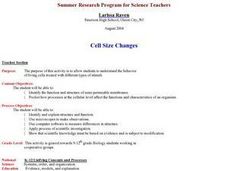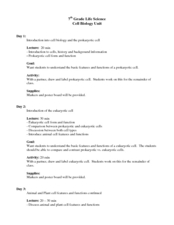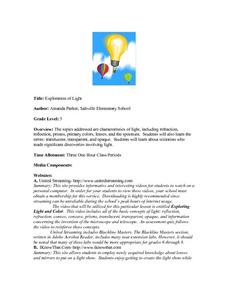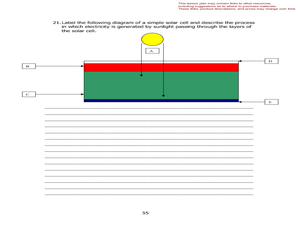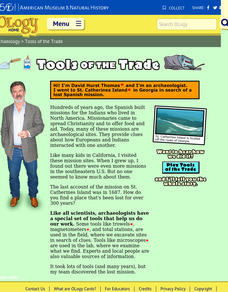Curated OER
Animal Organs and the Study of Reproduction, Embryology and Cancer
Students examine organs from dogs and cats to study reproduction, embryology, and the identification of cancer. They record their observations at both the gross and microscopic levels. They present their information to the class.
Curated OER
Comparing Plant and Animal Cells
In this comparing plant and animal cell worksheet, students use a microscope to observe cheek cells and onion cells. They compare their observations and answer 3 questions about their discoveries.
Curated OER
Human Epidermal Cells
Students explore epidermal cells. After following specified procedures for removing epidermal cells from their wrist, students view the cells with the use of a microscope. After creating a drawing of their observation, students label the...
Curated OER
PARAMECIUM RESPONSES TO STIMIULI
Learners design the test they use to examine, how the paramecium move, feed, and react to different types of stimuli such as a drop of vinegar. They conduct a lab experiment using a microscope.
Curated OER
The Parts of a Perfect Flower
Students explore the parts of a flower. In this flower structures lesson plan, students study a model of a flower and dissect a flower. They label each structure of the flower and observe the pollen grains and ovules under the dissecting...
Curated OER
Inquiry in Science Using an Animal Behavior Model
Students observe a planaria without a microscope and with a stereoscopic microscope. They draw the planaria and describe its motion and eating habits. Students research planarias various body systems and behavior. They design an...
Curated OER
Mission Possible
Students, in teams, solve a crime using forensic lab techniques. They apply lab techniques to a real life situation using a crime scenario that takes place on campus. Sample activities include Blood, Fiber, and Hair Lab.
Curated OER
Comparing Ovaries And Testes
In this reproductive system worksheet, high schoolers compare specimens of rat ovaries and testes. They complete 5 short answer pre-lab questions, follow an 11 step procedure and answer 5 analysis questions.
Curated OER
Bacteria's Role in Food
Students grow bacteria cultures on agar in petri dishes and do a plate count. They participate in a yogurt making lab to see how bacteria produce lactic acid. They prepare a recipe and identify fungi, fermentation and the role of...
Curated OER
Cell Size Changes
Learners examine the behavior of living cells treated with different types of stimuli. They watch an online movie, examine wet mount slides under a microscope, take an online quiz, and analyze data.
Curated OER
Biology: Understanding Cellular Organelles
Students distinguish the differences between Prokaryotic and Eukaryotic cells. Using microscopes, they examine a variety of plant and animal cells. Working in groups, they draw and label plant and animal cells and show the mathematical...
Curated OER
Sea Urchin Embryology
Students explore the process of evolution. They examine examples of how homeotic genes may work and obtain gametes. Using a microscope, students observe the fertilization of sea urchins. They video tape the process and write a...
Curated OER
Things Living in a Pond
Ninth graders observe, compare, and classify various microorganisms using a microscope. They answer discussion questions, and record their observations on a chart.
Curated OER
Plants: Scattering Seeds
Middle schoolers collect and microscopically examine seeds from the school yard and neighborhood. In small groups, they draw and discuss the shapes of the seeds to determine each plant's method of dispersal. they also test two types of...
Curated OER
Cell (Biology)
Students conduct a series of activities to explore the nature of cells. In this biology lesson, students observe plant and animal cells under the microscope and compare them. They differentiate osmosis and diffusion.
Curated OER
Exploration of Light
Fifth graders observe the video, Exploring Light and Color. They access a website to create their own light show. They conduct lab experiments to investigate refraction, reflection,and other light-related topics.
Curated OER
Microbiology Lesson
Students collect water samples and use a microscope to find bacteria in the samples. They categorize the different bacteria they find, determine the number of colonies there are, and predict how the bacteria levels might affect animals...
Curated OER
Anatomy of the Heart
In this anatomy of the heart worksheet, young scholars participate in a lab to describe the location of the heart in the body, identify a cardiac muscle tissue and trace the flow of blood through the heart.
Curated OER
Plankton / Phytoplankton
Students discuss the importance of plankton in the ocean ecosystem. In this biology lesson plan, students identify the different types plankton by observing them under the microscope. They explain how plankton population affect global...
Curated OER
Frosty the Snowman Meets His Demise: An Analogy to Carbon Dating
Students read and discuss an article about carbon dating, then participate in a hands-on lab to discover how carbon dating works. Students also write a letter to a friend explaining the process, and how archeologists use the process to...
Curated OER
Photovoltaics and Solar Energy
Young scholars experiment with photovoltaic cells and determine the energy use of their appliances. In this renewable energy lesson, students calculate the energy emitted by a photovoltaic cell through an inquiry-based lab. They keep...
Curated OER
Case Study Two: Shark Dissection
Students read an article on sharks prior to beginning a dissection lab. As part of the lab, students identify differences between the shark anatomy and human anatomy and hypothesize why those differences exist.
Chicago Botanic Garden
Are All Plants Created Equal?
Photosynthesis requires energy and produces food, and cellular respiration produces energy and requires food. An interesting lesson analyzes the factors that affect the rates of photosynthesis and respiration. Classes spend one day...
American Museum of Natural History
Tools of the Trade
Archaeologist David Hurst Thomas details his search for a lost Spanish Mission on St. Catherines Island, Georgia. A great way to introduce youngsters to the life of and the tools used by archaeologists.
Other popular searches
- Label Compound Microscope
- Label a Compound Microscope
- Letter E Microscope Lab
- Microscope Lab Activities
- Label Microscope Parts
- Light Microscope Lab
- Microscope Lab Rubric
- Electron Microscope Lab
- Blood Cells Microscope Lab
- Blood Microscope Lab
- Letter E Microscope Lab
- Biology Microscope Lab











